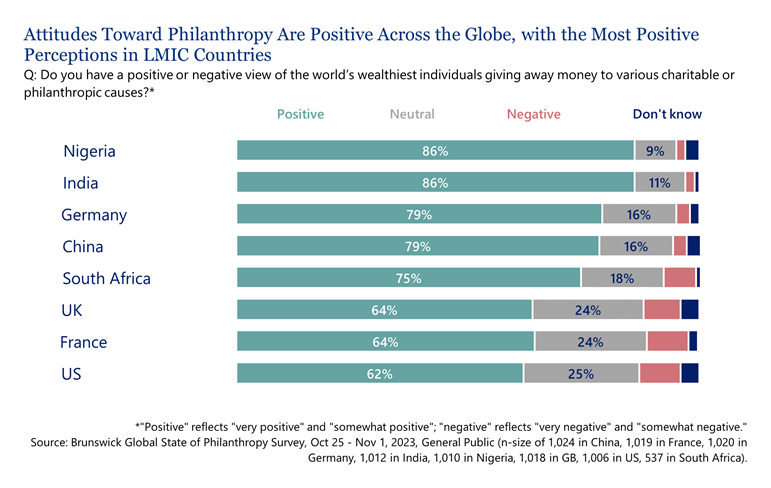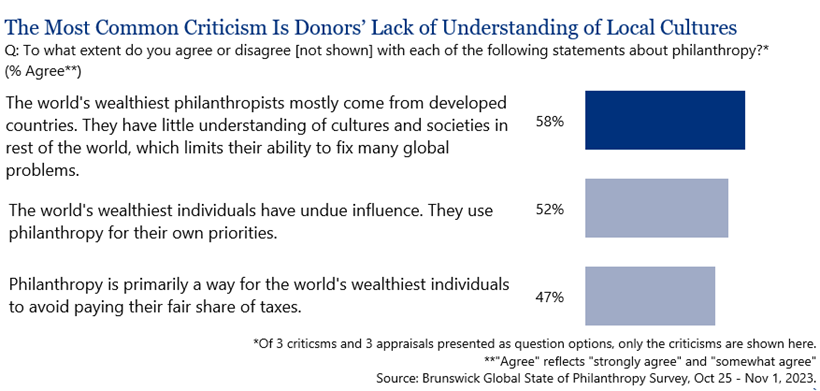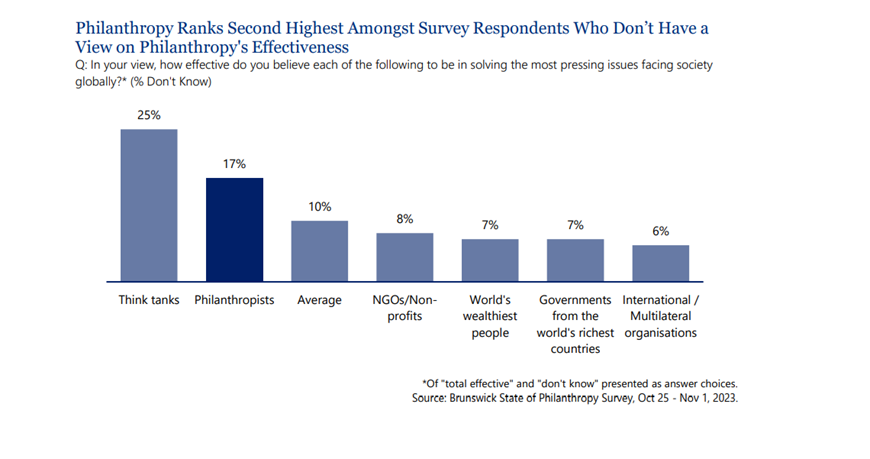What these tensions reveal is a potential trust deficit between philanthropy and the people it is trying to serve. Philanthropy is not always seen to be living up to its ambitions to play a positive role in society. The cumulative effect of these criticisms and shifting stakeholder expectations can lead to a sense of paralysis among donors – a “damned if you do, damned if you don’t” inertia that can result in less giving and less risk-taking at a time when the world has a greater need than ever for more philanthropic capital to address major challenges including climate change, pandemics, education and inequality.
To that end, Brunswick surveyed a cross-section of the public in eight representative countries – four in the Global North (high-income countries, or HIC), and four in the Global South (lower- and middle-income countries, or LMIC) – to gauge perceptions of philanthropy among the people whom donors are aiming to serve with their giving. The survey sought to explore differences in attitudes between different geographies, political affiliations and age groups to help fill an important gap in existing data.
Brunswick’s research uncovered widespread global support for philanthropy across geographies and demographics, indicating that Western media criticism is not necessarily reflective of the views of the public. Overall, people in lower- and middle-income countries feel more positive about philanthropy than their counterparts in higher-income, Western countries. While people in the United States feel the least positive about philanthropy relative to the other 7 countries, overall support for philanthropy in the US still rates as 62% positive and 25% neutral – a much higher approval rating than many types of institutions in the US today. The same patterns hold for people in France and the United Kingdom.
The most significant concern about philanthropy is donors’ lack of understanding of the local context and culture. This is a much more salient concern than some of the criticisms around tax or influence that are most often amplified by Western media. At the same time, more than 1 in 5 people do not yet have a view on the effectiveness of philanthropy – indicating an important opportunity to engage.
The key takeaway for philanthropists is that there is space to communicate philanthropic activities. They can and should proactively communicate about their giving – their motivations, activities and impact on people’s lives. Considerations for communications include the need to provide clarity on intentions as well as actions when it comes to addressing pressing problems; work with and incorporate the perspectives of local partners to understand and reflect the views of those you seek to work with; and be mindful of geographic differences when messaging about giving, as some markets and demographics have a clearer understanding of philanthropy than others.
Below are our key findings. You can view the entire research report here.
There is widespread global support for philanthropy among the public

Working in partnership with local organizations and leaders is key
The most salient criticism of philanthropy centers on donors’ lack of understanding of local cultures and contexts. This was the most resonant criticism in 5 out of 8 markets. Of note, this concern significantly outweighs criticisms most often amplified in Western media around accountability for philanthropists. Philanthropists should customize their approach and message to align with the cultural norms of the specific region they're in.

Donors have an opportunity to proactively engage the public on the role of philanthropy and the impact of giving
While the majority of the general public globally has an opinion on the world’s wealthiest giving away their money, 17% do not yet have a view on the effectiveness of philanthropy. This suggests a mixed understanding about philanthropists and an opportunity to clarify motivations and impact.

Download a copy of this report here.



